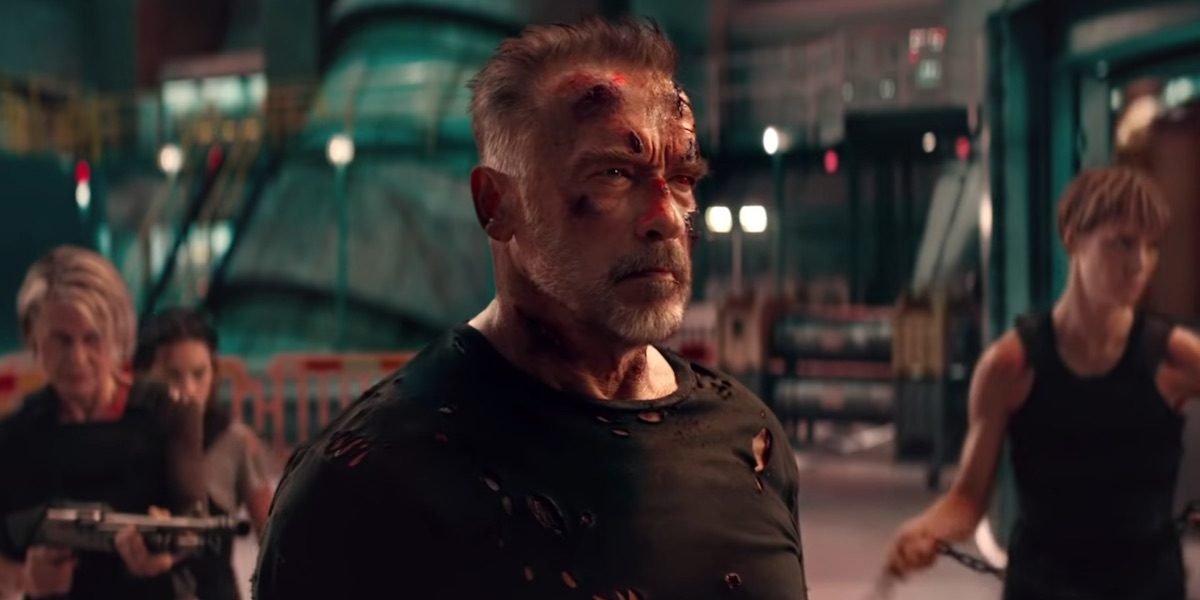In recent years, one growing trend in the film industry that has seen incredible success is what could be called “Redemption Sequels.” These are specific franchise projects that arrive not only a good number of years after their direct predecessor, but also are burdened by the fact that they are following a movie (or multiple movies) that soured their brand by notably disappointing audiences.
Redemption Sequels are produced in hopes of reviving legacies, and generally operate by going back to basics and trying to hone in on exactly what made the series popular to begin with. We’ve now seen it work multiple time, some better than others, with titles such as J.J. Abrams’ Star Wars: The Force Awakens, Colin Trevorrow’s Jurassic World, and David Gordon Green’s Halloween. To use another buzz word, these are basically “remakequels” but worked because they (again, some more than others) recaptured the spirit of their respective seminal stories.
Now it's Terminator’s turn to find that same kind of redemption, as Tim Miller’s Terminator: Dark Fate is the best sequel that this series has seen since 1991 and the release of James Cameron’s Terminator 2: Judgement Day. The new film takes a very similar approach to 2018’s Halloween – scrapping elements of the continuity, and not only bringing back franchise legends in front of the camera, but also behind it – and while the plot is very much a return to the formula of the first two movies, it works because it has an outstanding collection of dynamic and fun characters, great performances from the whole ensemble, and some bold and thrilling action sequences.
Ignoring all of the events featured in Terminator 3: Rise of the Machines, Terminator Salvation, and Terminator Genisys, Terminator: Dark Fate picks up years after Sarah Connor (Linda Hamilton) and her son, John (Edward Furlong), managed to change the future and stop Cyberdyne Systems from launching Skynet… but through the events of the film, we learn that it wasn’t enough to stop the coming and seemingly inevitable artificial intelligence-driven apocalypse. Now instead it’s a superintelligence called Legion that is causing machine-enacted chaos – but still there exists the hope to change things via time travel.
It’s this that leads Grace (Mackenzie Davis), a human with artificial enhancements to go from the year 2042 to 2020. It’s in this year that she is meant to meet Daniella "Dani" Ramos (Natalia Reyes), a young woman working a factory job in Mexico City who has a target on her back courtesy of Legion. The artificial intelligence has also sent back one of their own, a model called the Rev-9 (Gabriel Luna), and it is Grace’s responsibility to stop it from terminating Dani.
Given that the Rev-9 is an absolutely deadly machine that has the ability to remotely control its endoskeleton while functioning apart from it, Grace definitely has her work cut out for her, but she isn’t alone in the battle. Twenty-three years after what was supposed to be the end of the world, Sarah Connor is still fighting the future, and though she is very far from what you might call a “people person,” she becomes a key ally in working to protect Dani.
With its pair of time travelers – one good, and one evil – and a mission to protect a woman in the past who is the key to saving humanity’s future, the new film clearly shares a lot of DNA with James Cameron’s original Terminator from 1984, which certainly isn’t an amazing thing for those who might have been hoping for something a little bit more original and creative story-wise. But while you may find the plot to be a bit lacking, what really drives the experience is its core ensemble, and Tim Miller’s work behind the camera.
Your Daily Blend of Entertainment News
Starting with the material that does feel legitimately fresh, audiences are introduced to two engaging and interesting protagonists in this movie, and one seriously intense and thrilling villain. Mackenzie Grace is phenomenal in the role of Grace, as her dedication and passion pours out of her every moment that she’s on the screen, and she proves to be a superb ass-kicker as well. Meanwhile, Natalia Reyes’ Dani definitely has a totally different energy, regularly panicked as bedlam takes over her life, and her world starts crumbling all around her, but much like Linda Hamilton was able to do back in the mid-1980s, she is still able to project a particular strength that instantly informs you that she isn’t ever just going to lie down and give up.
Gabriel Luna’s Rev-9 also provides a solidly executed twist on the familiar. Obviously Terminators aren’t exactly the most emotionally expressive creations, but this model has surprising moments of sinister personality. The real job for him, however, is being Terminator: Dark Fate’s unrelenting, unstoppable force of technology, and that is intensity that he sells excellently. Each time he catches up with the heroes, the stakes instantly rise, as his simple presence delivers a palpable concern that not everyone is going to make it out of a scene.
Ultimately, though, the big game changers here are both Linda Hamilton and Arnold Schwarzenegger, and not just because their roles in the story don’t have any direct comparisons in the original Terminator. It’s mostly because it’s fascinating to see how they’ve changed over the many decades since we first met them (though it should be noted that Schwarzenegger is playing a wholly new character to whom we are introduced in this movie). It’s fascinating because the two have practically swapped sensibilities. While Sarah Connor may have been successful in stopping the rise of Skynet, the victory doesn’t satiate her paranoia and fear, and she essentially becomes a Terminator in her own right as she lives her life with a single purpose. Furthermore, Hamilton’s performance is fascinating, as Sarah is far too rough around the edges to be likable, but her intense determination is admirable, and she has a fantastic dry wit.
In contrast, this new Schwarzenegger character – a T-800 model who goes by the name Carl – has lived a totally different life. While not too much can be revealed at this time about his part in the movie due to spoilers, he is a Terminator who has existed for long enough among humans for it to essentially change his core programming. He has adapted far more in normal society than any other Terminator, and the result is a totally different Schwarzenegger part, despite the fact that he’s now been in five of these movies.
Terminator: Dark Fate also may only be Tim Miller’s second movie as a director after spending most of his career in the visual effects field, but he is clearly learning fast, as particularly evident in the movie’s pacing and action sequences. This is a film that is just unrelenting in its first act, as it wastes very little time in between introducing the heroes and the villain, before jumping into the chase that basically defines the whole plot. It’s actually kind of shocking just how extended the opening action is, as it speeds from location to location, and just when you think it’s going to wrap up, a new twist is introduced that makes circumstances that much more dangerous for the leads. And while this isn’t a high energy level that dominates the entire film, as things get more character-based as we move towards the middle of the story, it returns when it’s needed, and Miller delivers a thrilling third act battle.
With the exception of the underrated two-season Terminator: The Sarah Connor Chronicles television series, watching this franchise in recent decades has been largely a depressing affair, as there is clearly so much potential available in the big picture high-concept premise, and yet three movies totally whiffed it. The result is that Terminator: Dark Fate had a low bar to clear, but that doesn’t undercut that it’s still a very satisfying experience. We can only hope that the big future that the brand clearly has planned is able to keep producing movies that are as good or better.

Eric Eisenberg is the Assistant Managing Editor at CinemaBlend. After graduating Boston University and earning a bachelor’s degree in journalism, he took a part-time job as a staff writer for CinemaBlend, and after six months was offered the opportunity to move to Los Angeles and take on a newly created West Coast Editor position. Over a decade later, he's continuing to advance his interests and expertise. In addition to conducting filmmaker interviews and contributing to the news and feature content of the site, Eric also oversees the Movie Reviews section, writes the the weekend box office report (published Sundays), and is the site's resident Stephen King expert. He has two King-related columns.

